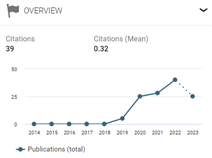Dampak harga diri, kepuasan hidup, dan depresi terhadap kesejahteraan psikologis mahasiswa keperawatan Poltekkes Kemenkes Aceh
DOI: 10.30867/gikes.v5i3B.2162Abstract
Background: Psychological well-being is a very important component in the training and development of nursing students, because it can increase productivity and success in the academic and training activities they undergo. If this psychological well-being problem is not resolved, it will affect students' social interaction, achievement and interest in learning and this will have a negative impact on the future process.
Objectives: This study aims to analyze the factors related to the psychological well-being of nursing.
Methods: This research has an analytical survey design with a correlational approach. The number of samples in this study was 642 respondents. The sampling technique in this research is total sampling. The research was conducted at a health polytechnic in Aceh in 2020. Data was collected using the Psychological Well-Being Scale questionnaire, Rosenberg Self Esteem Scale, Satisfaction With Life Scale via Google form and using Mann Whitney U Test analysis.
Results: The results of the stepwise analysis show all independent variables, namely difficulties in social relations (p= 0.01), self-esteem (p= 0.01), depression (p= 0,01) and life satisfaction (p= 0,02) are the dominant predictors related to psychological well-being in Diploma III Nursing students.
Conclusion: This research recommends planning interventions for nursing students to improve their psychological well-being, taking into account these dominant factors.
Keywords
Full Text:
PDFReferences
Abdullah, M. C., Adebayo, A. S., & Talib, A. R. (2015). Relationship between Demographic Factors, Social Support and Sociocultural Adjustment among International Post Graduate Students in a Malaysian Public University. Journal of Educational and Social Research, 5(2), 87–92. https://doi.org/10.5901/jesr.2015.v5n2p87
Aradilla-Herrero, A., Tomás-Sábado, J., & Gómez-Benito, J. (2014). Associations between emotional intelligence, depression and suicide risk in nursing students. Nurse Education Today, 34(4), 520–525. https://doi.org/10.1016/j.nedt.2013.07.001
Batool, S. F., & Sajid, N. A. (2022). Nursing students and their influence of resilience and psychological wellbeing on attitude to death. Journal of Nurses and Midwives Pakistan.
Cedillo, Y. E., Kelly, T., Davis, E., Durham, L., Smith, D. L., Kennedy, R. E., & Fernández, J. R. (2023). Evaluation of food security status, psychological well-being, and stress on BMI and diet-related behaviors among a sample of college students. Public Health, 224, 32–40. https://doi.org/10.1016/j.puhe.2023.08.015
Charlton, A. C., & Wofford, L. G. (2022). Maladaptive coping behaviors in pre-licensure nursing students: An integrative review. Journal of Professional Nursing, 39, 156–164. https://doi.org/10.1016/j.profnurs.2022.01.011
Edwards, D., Burnard, P., Bennett, K., & Hebden, U. (2010). A longitudinal study of stress and self-esteem in student nurses. Nurse Education Today, 30(1), 78–84. https://doi.org/10.1016/j.nedt.2009.06.008
Figueira, J. A., Sarafim-Silva, B. A. M., Gonçalves, G. M., Aranha, L. N., Lopes, F. L., Corrente, J. E., Biasoli, É. R., Miyahara, G. I., & Bernabé, D. G. (2022). Predisposing factors for increased cortisol levels in oral cancer patients. Comprehensive Psychoneuroendocrinology, 9. https://doi.org/10.1016/j.cpnec.2022.100110
Gao, J., & McLellan, R. (2018). Using Ryffs scales of psychological well being in adolescnts. BMC Psychology, 6(17), 1–8.
Ibrahim, I. A., El-monshed, A. H., El-sehrawy, M. G., Elamir, H., & Abdelrahim, S. M. (2023). Enhancing Nurses ’ Well-Being : Exploring the Relationship between Transformational Leadership , Organizational Justice , and Quality of Nursing Work Life. 2023.
Murray, M., Murray, L., & Donnelly, M. (2016). Systematic review of interventions to improve the psychological well-being of general practitioners. BMC Family Practice, 17(1). https://doi.org/10.1186/s12875-016-0431-1
Ratanasiripong, P., & Wang, C. C. D. C. (2011). Psychological well-being of Thai nursing students. Nurse Education Today, 31(4), 412–416. https://doi.org/10.1016/j.nedt.2010.08.002
Tung, Y. J., Lo, K. K. H., Ho, R. C. M., & Tam, W. S. W. (2018). Prevalence of depression among nursing students: A systematic review and meta-analysis. Nurse Education Today, 63(June 2017), 119–129. https://doi.org/10.1016/j.nedt.2018.01.009
Yang, Y., Wang, J., Chen, Y., Chen, X., Lin, H., & Fu, C. (2023). Loneliness, internalizing and externalizing problems, and suicidal ideation among Chinese adolescents: a longitudinal mediation analysis. Population Medicine, 5(Supplement), 1–9. https://doi.org/10.18332/popmed/165679
Yoon, H. S., & Choi, S. H. (2019). The impact on life satisfaction of nursing students using the fuzzy regression model. International Journal of Fuzzy Logic and Intelligent Systems, 19(2), 59–66. https://doi.org/10.5391/IJFIS.2019.19.2.59
Refbacks
- There are currently no refbacks.













